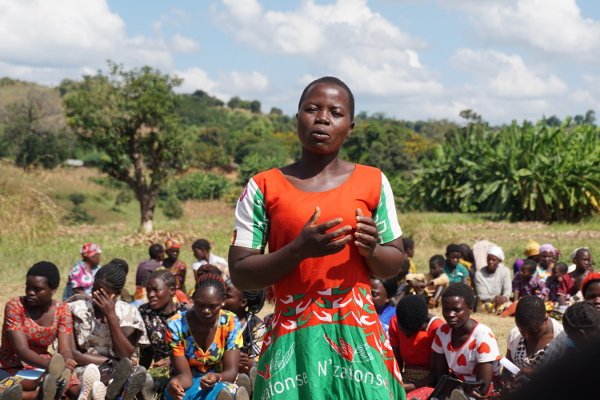Help us use the power of radio…
…to empower teenage girls and young women to
tackle their sexual and reproductive health challenges.
Group member Rachel and the chair Patricia are both happy with the impact of the radio programmes on sexual health.
“People hear information firsthand, knowing it comes from experts. Young women are getting services. There is going to be a mindset change. It will make progress in the community.”
In 2023 the charity has been developing brilliant radio programmes in Malawi.
The broadcasts encourage teenage girls and young women to have discussions about the sexual and reproductive health issues they face - and how they can overcome them.
In 2024, we will, with our supporters help, roll out further radio programming and new episodes. With your support, we can also set-up over 280 new community health groups across the Ntchisi district, reaching thousands of girls.
These groups act as listening clubs, where the young women gather around a radio – provided by our partner on the project – to listen to the programmes and then engage in meaningful dialogue around the important issues raised each week.
Would you be able to help this crucial work with a donation?
Your gift could help more young women attend their local community health group for the next year – giving them access to essential, important health information.
Every £30 could help 12 more young women attend their local community health group for the next 6 months.
The radio show is called ‘Atsikana Ovaya’ (‘Cool girls’ in Chichewa, their way of positively identifying themselves). The theme tune brilliantly outlines both the problems the young women face, and their positive, can-do attitude to overcoming them. The upbeat song contains these meaningful lyrics:
“Radio is empowering us with solutions. When men want to have sex, we can ask them if they have a condom.”
“We are girls on the move. This is our time. We know the importance of protecting ourselves. We have a vision. We have goals to accomplish.
“We say no to early and forced marriages. We say no to underage pregnancies. We say no to getting pregnant when we are not ready.
“Girls on the move, (the) time is now for us to engage in meaningful discussions. Let’s avoid unprotected sex and sleeping around. It is time to move forward with our dreams and goals.
“Parents, traditional leaders, faith leaders, let us hold hands. We are girls on the move, that are moving forward, girls that are knowledgeable and know what we want.”
Estina, chair of the Nthondo village community group, talks through some of the critical issues.
These women want autonomy. We want to support them. To enable them to have healthy relationships with their parents and boyfriends. To have the power to make their own decisions and know their rights.
Societal expectations, harmful myths around contraception and difficulty reaching vital health services all form barriers. These affect their ability to prevent or delay pregnancy, impacting their capability to have rich, fulfilling lives.
1 in 5 women are sexually abused before they are 18. 15–19-year-olds are twice as likely to die in pregnancy and childbirth than women aged over 20.
Many believe contraception is only available to married couples, or can make you infertile.
We know the work of Women and Children First and our partners MaiKhanda Trust and Farm Radio Trust, setting up groups and broadcasting radio programmes is having an important, positive effect.
The Village Headman in Champhoyo area has successfully curbed 3 underage marriages - a direct result of heightened awareness from the radio.
Chipondo, the Headman, says there’s been a marked decrease in teenage pregnancies due to the effective dissemination of contraception information.
Crucially, the shows prompt action and dialogue. The groups and programme work together to provide more than information. It’s a soap. It gives people encouragement to talk about issues. It provides young women with a call to action.
Girls agree, “We pledge, as a group, that we are going to talk to our parents about contraception.”
Good sexual and reproductive health saves lives by reducing unsafe abortions and deliveries.
It helps women meet their potential, and builds stronger, healthier, wealthier communities. Health education is most effective and empowering if it involves dialogue and problem-solving, rather than message-giving.
Our community health groups can halve maternal mortality, reduce neonatal mortality by a third and can increase uptake of contraception by a quarter.
Please consider supporting us in establishing 280 new innovative community groups across Malawi. Your donation can enable more girls to receive support, get power and take control of their lives.
Members of the Nthondo village community group and chairperson Estina Zingani (centre left)
© Women & Children First (UK)
Registered Charity No. 1085096
Registered Office: Women and Children First, 483 Green Lanes, London, N13 4BS
Telephone: +44 (0)20 7700 6309 | E-mail: info@womenandchildrenfirst.org.uk
Website Terms and Conditions | Privacy Policy | Fundraising Promise
Stay close to us: Subscribe to our newsletter



